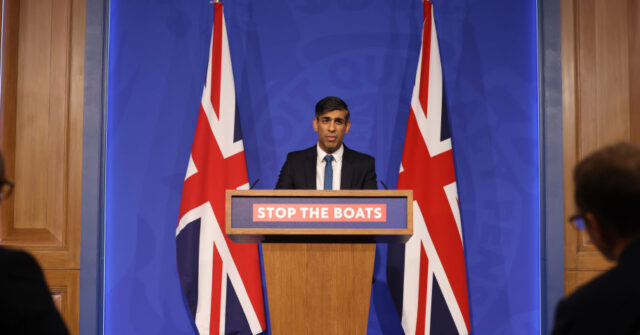Top News
‘I Will Not Allow a Foreign Court to Block These Flights’: PM Sunak Vows ‘Emergency Legislation’ to Enable Deporations

UK Prime Minister Rishi Sunak makes a bid to overcome the Supreme Court blocking his migrant deportation plan, vowing a fresh treaty with Rwanda to overcome objections in the ruling, and vowing to go against the European Court on Human Rights on the matter if challenged.
“I will not allow a foreign court to block these flights. If the Strasbourg Court chooses to intervene against the express wishes of Parliament, I am willing to do what is necessary to get flights off”, Rishi Sunak told voters on Wednesday afternoon. Giving a press conference on his new plan to deliver on his so-far unrealised promise to “stop the boats” the Prime Minister outlined a series of measures he vowed to take to discourage illegal migration to the United Kingdom.
Chief among them, he said, was to rapidly deploy a new treaty with Rwanda intended to overcome the objections of the UK’s Supreme Court to the so-called Rwanda plan as it is. The Court ruled this morning that the plan, which seeks to save money on housing failed asylum seekers in UK hotels by sending them to live at a cheaper cost in Rwanda instead , was not presently legal. While it found — as the PM emphasised — the policy is lawful in principle, it falls down because the court decided there was a risk of “refoulement”, meaning that asylum seekers sent to Rwanda could be deported again to their homelands by the Rwandan government at a later date.
Sunak Stumbles Again: Top Court Blocks Rwanda Migrant Resettlement Planhttps://t.co/ynWHHy4Dbs
— Breitbart London (@BreitbartLondon) November 15, 2023
The Prime Minister said a new treaty binding the Rwandan government not to do that would mean all legal objections had been overcome. He said: “I said I was going to fundamentally change our country, and I meant it. So I am also announcing today that we will take the extraordinary step of introducing emergency legislation.
“This will enable Parliament to confirm that with our new treaty, Rwanda is safe. It will ensure that people cannot further delay flights by bringing systemic challenges in our domestic courts, and stop our policy being repeatedly blocked.”
Claiming to be able to overcome the domestic court issue of lawfare by pro-migration lawyers trying to derail government policy with the new treaty and “emergency legislation”, Sunak next turned to the issue of the European Court of Human Rights, the Brussels-based institution that the United Kingdom decided not to leave at the same time as the European Union. Had the Rwanda policy been deemed legal today, doubtless the case would have been referred upwards to Brussels and the Prime Minister said he would reject foreign interference in the matter.
He said: “of course, we must be honest about the fact that even when Parliament has changed the law here at home, we could still face challenges from the European Court of Human Rights in Strasbourg.
Dumb or Duplicitous: Braverman Blasts Sunak for Failing to Deliver on Cutting Migrationhttps://t.co/oxdxUTjLvu
— Breitbart London (@BreitbartLondon) November 15, 2023
“I told Parliament earlier today that I am willing to change our laws and revisit those international relationships to remove the obstacles in our way. So let me tell everybody now, I will not allow a foreign court to block these flights. If the Strasbourg Court chooses to interevene against the express wishes of Parliament, I am willing to do what is necessary to get flights off.”
Sunak said European Court interventionism in his policy was counter the founding principles and purpose of the institution — which was created by Britain and others as a means of keeping the peace in Europe after the Second World War — and in any case cited a series of European nations that were seeking to enact their own Rwanda-like policies.
While Sunak’s speech promised much, the track record of Conservative governments on delivering on immigration control has been extremely poor so far and much of the speech appeared to concentrate on defending himself from internal critics, while even focussing on attacking his own party’s performance. The Prime Minister said “This government has done more and delivered more than any government in the last five years to tackle illegal migration”, without also noting the Conservative Party has been in power for the past 13 years.
This story is developing, more follows
Read the full article here


















